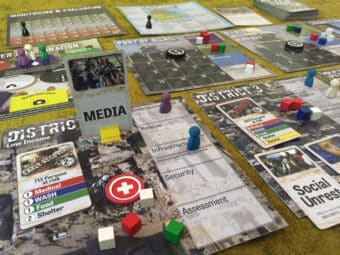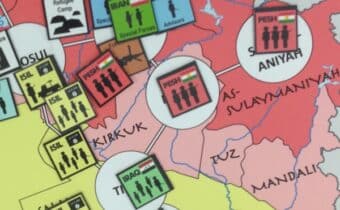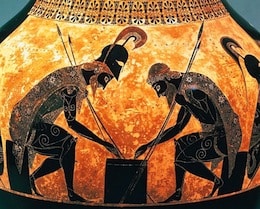Notes from the Noteworthy:
Rex Brynen and PAXsims

You are on the faculty at McGill University. Tell us about your background and your programs at McGill.
I’m a Professor in the Department of Political Science at McGill University, in Montréal (https://www.mcgill.ca/politicalscience/rex-j-brynen). Most of my academic writing is about Middle East politics, but I also teach about peace operations and about conflict simulation. I’ve also worked in government on foreign policy, development, and intelligence issues, and as a consultant to NATO, various United Nations agencies, and the World Bank.
When did you establish PAXsims?

What are your objectives for your blog site?
We never thought it would be as successful as it turned out to be! It was just a place to post material we found interesting, and to share our own experiences. That first year we had 20,000 viewers, the next year double that, and now we have about 120,000 page views annually. I receive emails every week from people sharing ideas about conflict simulation. It’s been a great way of building new contacts and networks.
How do you select the topics that you cover?
We cover anything that relates to the use of serious games to address conflict, peacebuilding, humanitarian assistance, and development. We deliberately cast our net wide, well beyond traditional force-on-force wargaming.
Can you tell us about the PAXsims staff?
We’re all unpaid volunteers, who work on PAXsims out of interest. I’m senior editor and do most of the posting; Gary still contributes on occasion; Stephen-Downes-Martin (US Naval War College), Devin Ellis (ICONS Project), Tom Fisher (Imaginetic), Tom Mouat (Defence Academy of the UK) are associate editors; and we have several volunteer interns. We also invite guest contributions by others too.

I think we’ve seen a clear influence of Eurogames on wargame design. Such games that are faster to play and stress elegant, relatively simple, rulesets—and hence tend to be more accessible to newcomers. There will always be a place for monster games and Advanced Squad Leader too, of course! Some players will always prefer accuracy even at the cost of playability, while others will prefer playability even at some loss in accuracy. There are advantages to both.
We are also seeing the beginning of an interesting discussion on representation in wargaming—a point that the New York Times even picked up on in an excellent article earlier this month (https://www.nytimes.com/2019/08/01/style/board-games-cancel-culture.html) The hobby has been dominated by certain perspectives, and those are beginning to broaden. That’s a good thing, I think—the more, the merrier.
How does PAXsims support the efforts to professionalize wargaming?
We try to contribute to more thoughtful game design and facilitation, by sharing perspectives, highlighting best practice, and linking to relevant scholarship and research. That being said, wargaming is just a tool, whether for education or analysis. Sometimes it is a very good tool. Other times it may be less useful. I’m a little wary of efforts to overhype serious gaming, or make professional wargaming an elite guild.
What is the future of PAXsims?
I would certainly like to increase the diversity of the website, in terms of the topics we cover, the authors we host, and our editorial staff.
PAXsims has published a couple of serious game designs: AFTERSHOCK: A Humanitarian Crisis Game (https://paxsims.wordpress.com/aftershock) and The Matrix Game Construction Kit (https://paxsims.wordpress.com/magck). A number of us are codesigners for We Are Coming, Nineveh, a forthcoming game to be published by Nuts! Publishing on the 2017 liberation of Mosul by the Iraqi security forces. PAXsims hosts the annual Connections North professional wargaming conference at McGill University each February (https://paxsims.wordpress.com/connections-north/), and we also organize the annual McGill megagame. We will continue to do those sorts of things too. It’s just a case of finding enough time—I have a day job, after all!

